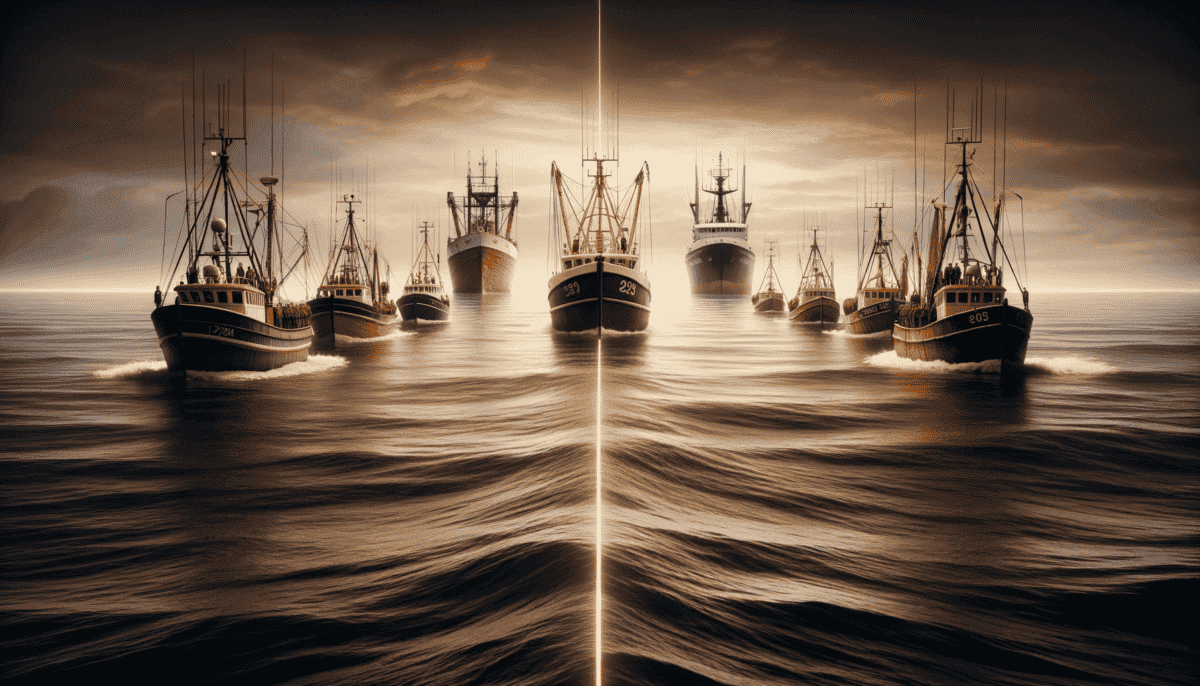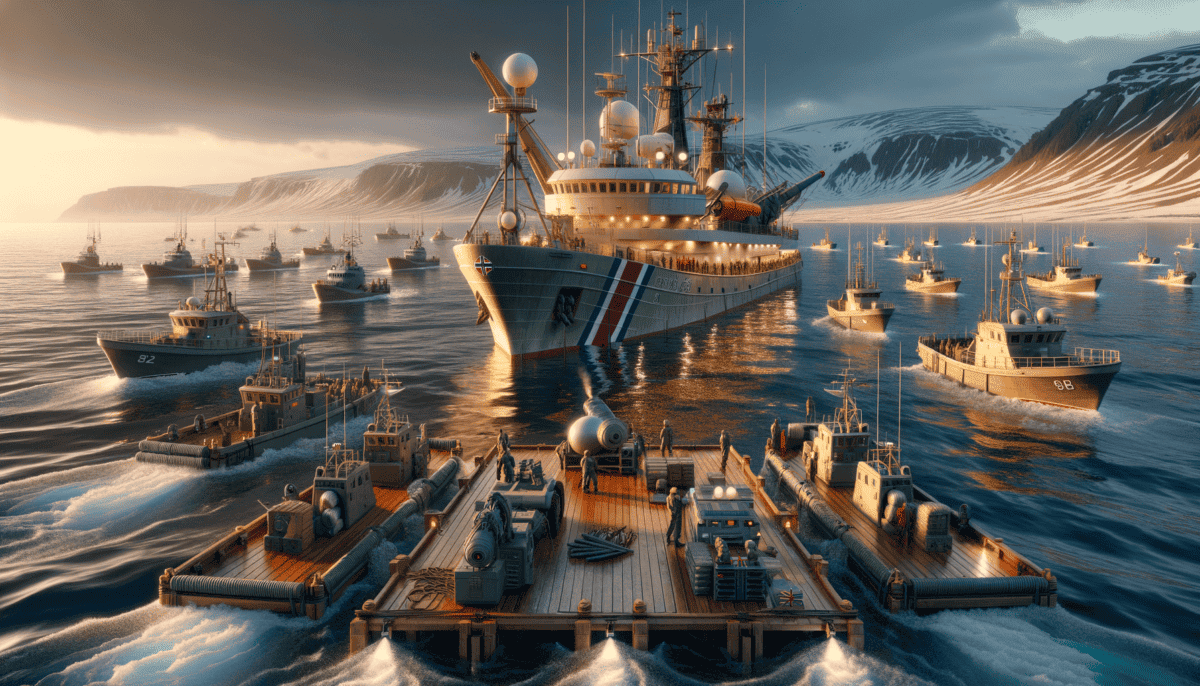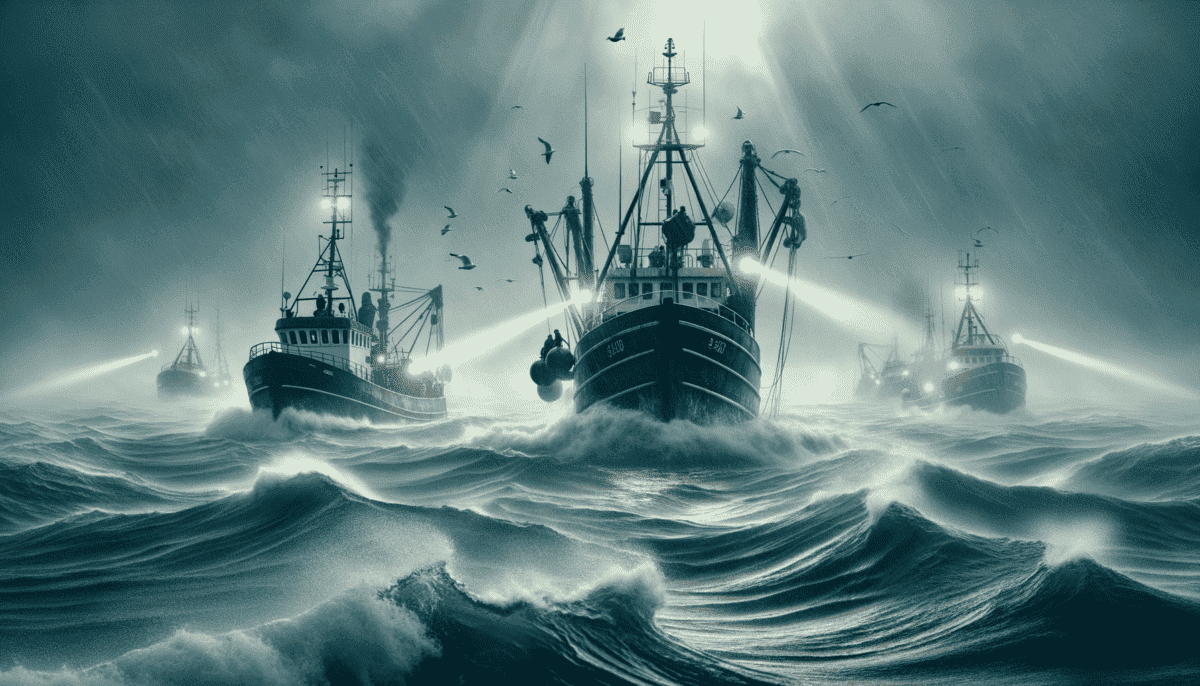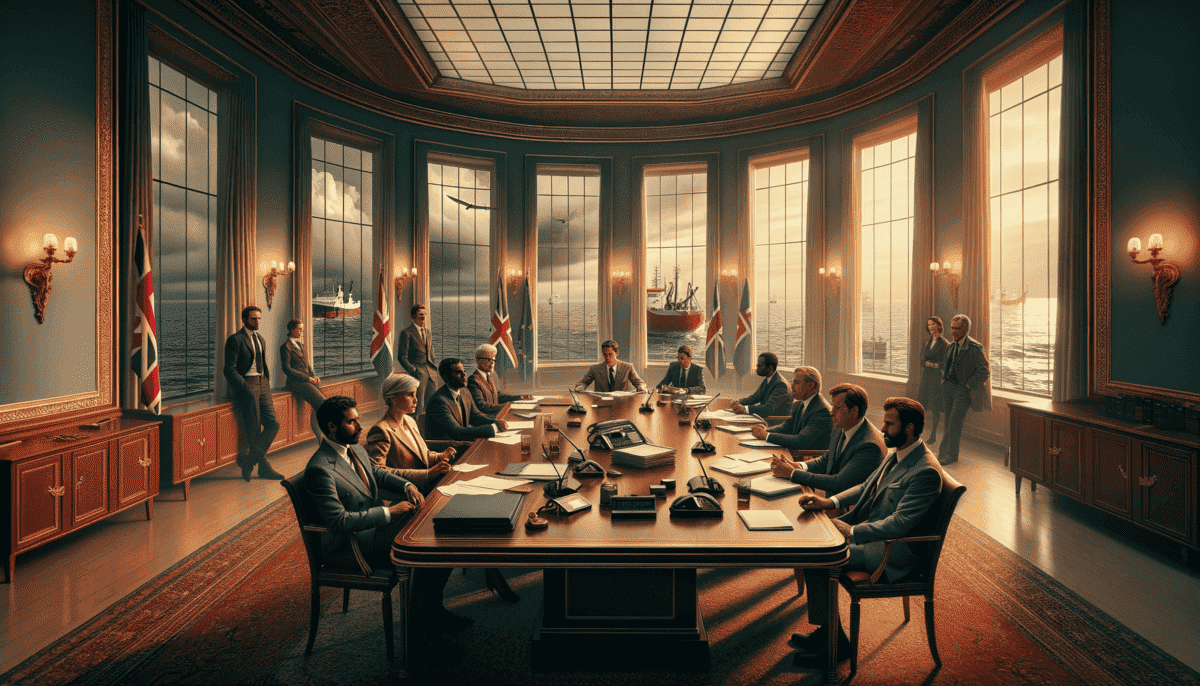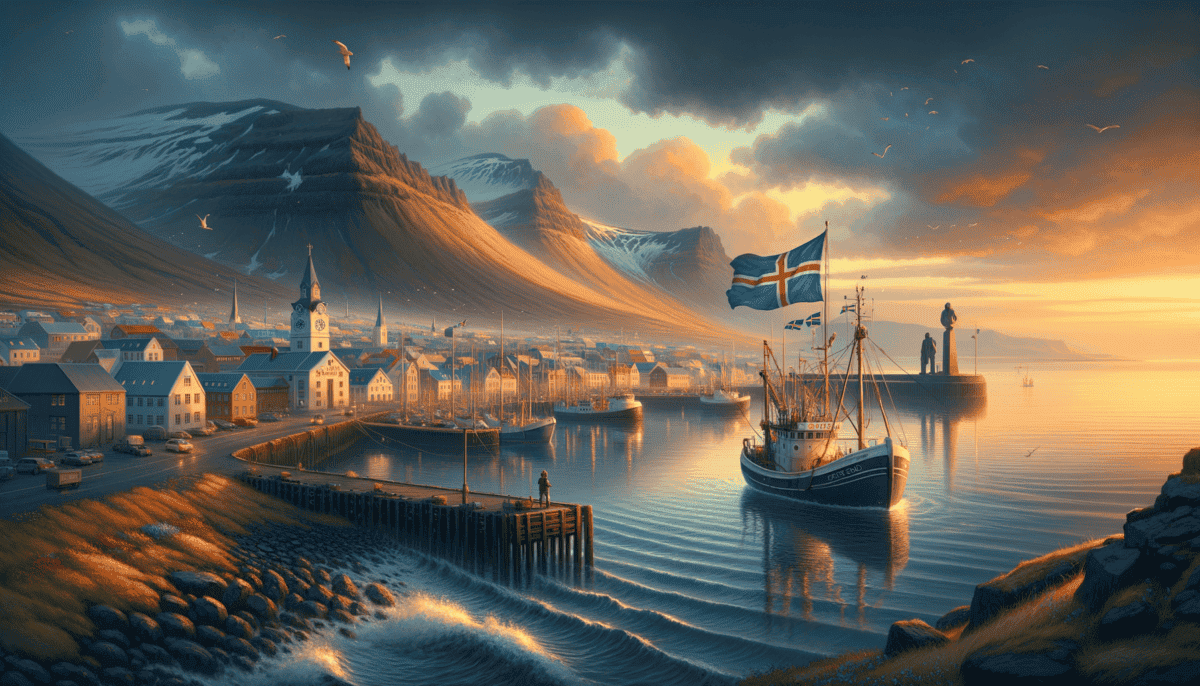The Tiny Island’s Big Dream
Far up in the cold North Atlantic Ocean, there was a small island called Iceland. It was a special place where the sea was full of fish, and the people loved fishing more than anything else in the world!
The waters around Iceland were like a giant swimming pool for fish. Cod, the most important fish of all, lived there in huge numbers. These fish were so important that they were like gold to the people of Iceland!
Little Erik lived with his family in a small fishing village. His dad was a fisherman, just like his grandpa had been. One morning, Erik woke up early to watch his father's boat leave the harbor.
"Dad, why do you have to go so far out to fish?" Erik asked, wrapping his warm scarf tighter.
His father smiled and ruffled Erik's hair. "Because, son, there are so many big boats from other countries fishing in our waters. We need to protect our fish – they're our treasure!"
“The sea has always been our friend,” Grandpa Magnus would say. “It gives us food, jobs, and helps our country grow strong.”
But there was a big problem. Big boats from Britain were coming closer and closer to Iceland's shores. These huge trawlers could catch more fish in one day than Iceland's small boats could catch in a week!
Did you know that fishing was so important to Iceland that they put pictures of fish on their money? That’s how much they cared about their swimming friends!
The people of Iceland started to worry. They needed those fish to feed their families and keep their country running. It was like having a garden where suddenly, everyone from the neighborhood started picking your vegetables without asking!
Erik's mom, Anna, worked at the fish processing plant. "We need to do something," she would say during dinner. "These are our waters, our fish, our future!"
The Icelandic government had a big idea: they would make a special line in the sea. Any boats that wanted to fish inside that line would need to ask Iceland first!
But the British fishing boats didn't like this idea at all. They had been fishing in these waters for many years and didn't want to stop. It was like two kids fighting over the same toy in a playground!
The Big Decision
One evening, Erik sat with his grandpa looking at old photos of fishing boats. "Grandpa, will there be enough fish for me when I grow up?"
Grandpa Magnus put his arm around Erik. "That's exactly why we need to protect our waters now, little one. It's not just about today – it's about tomorrow too!"
The leaders of Iceland made their choice. They would stand up for their tiny island nation. They would protect their fish, their people, and their future. Even if it meant making the big, powerful Britain angry!
Young Erik watched from the harbor as more patrol boats started guarding Iceland's waters. He could feel that something big was about to happen. The tiny island of Iceland was about to show the world that even small nations could dream big and fight for what was right!
The wind carried salty sea spray across Erik's face as he waved to the patrol boats. Tomorrow would bring new challenges, but Iceland was ready to face them. After all, they had been seafarers for a thousand years – and they weren't about to stop now!
Boundaries of Conflict
The sun rose over Iceland’s harbor as Erik watched his father prepare the fishing boat. But today was different. There was worry in Dad’s eyes. Iceland had just made its fishing zone bigger – from 4 miles to 12 miles from shore.
“What does 12 miles mean, Dad?” Erik asked, helping to coil ropes on the dock.
“Well, son, imagine walking from our house to Grandma’s house. Now imagine doing that twelve times. That’s how far out we’re saying other countries can’t fish without asking us first.”
The distance of 12 nautical miles is about as long as 240 football fields put together! That’s a lot of ocean to protect!
But the British fishing boats weren’t happy. They had been fishing these waters for many years. Captain James Thompson of the British trawler “Northern Star” told his crew, “These waters have fed British families for generations. We can’t just leave!”
“The fish don’t wear flags,” British sailors would say. “They don’t know if they’re swimming in British or Icelandic waters!”
Soon, the quiet ocean became a place of angry voices and worried faces. British fishing boats kept coming, and Iceland’s patrol boats tried to make them leave. It was like a game of cat and mouse, but nobody was having fun.
The Growing Storm
Erik’s family gathered around the radio each night to hear the news. More and more British boats were coming closer to Iceland’s shores. The British government sent warships to protect their fishing boats.
“But why can’t they understand?” Erik asked his mom one evening. “These are our fish!”
“It’s not that simple, sweetheart,” she replied. “The British fishermen need to feed their families too. But we’re a small country, and fishing is all we have.”
The situation was getting serious. Both countries were determined to protect what they believed was right.
Important people from both countries tried to talk and find a solution. Mr. Jóhannesson, Iceland’s leader, stood firm: “We must protect our waters. Our future depends on it!” Meanwhile, British Prime Minister Harold Macmillan worried about British fishing towns that might lose their jobs.
Daily Life Changes
Life in Erik’s village changed. The fishermen started going out in groups for safety. They carried radios to call for help if British boats came too close. Even the children played new games, pretending to be patrol boat captains protecting their waters.
One morning, Erik’s father came home early, looking tired. “The British boats were there again,” he said. “We couldn’t fish where we wanted to. They had big warships with them.”
Grandpa Magnus shook his head. “In all my years at sea, I never thought I’d see warships in our fishing grounds. But we must stay strong. We’re fighting for our future.”
The World Watches
News of the conflict spread around the world. Other countries watched as tiny Iceland stood up to powerful Britain. Some people called it “David versus Goliath at sea.”
Erik’s teacher put up a new map in the classroom, showing the 12-mile line. “This line might look small on the map,” she said, “but it’s very important for our country.”
The British tried something new – they stopped buying fish from Iceland. They thought this would make Iceland give up. But the Icelandic people were determined. They found new places to sell their fish.
Sometimes standing up for what you believe in means facing big challenges. Iceland was showing the world that even small countries could be brave!
As winter approached, the seas got rougher and the situation more dangerous. Both sides knew something had to change. But what? And who would make the first move?
Erik stood at his bedroom window each night, watching the lights of fishing boats on the horizon. He knew that out there, in the dark waters, a battle for his country’s future was being fought – not with guns, but with determination, courage, and hope.
Nets and Numbers
The waves crashed against Erik’s father’s boat as new equipment arrived at the harbor. Shiny radar screens and stronger nets were being loaded onto fishing vessels. The year was 1960, and both Iceland and Britain were getting better at playing this dangerous game at sea.
New radar systems could now spot boats from far away, like having super-powered eyes that could see through fog and darkness!
“Look at this, Erik!” his father called, pointing to a new device. “This sonar helps us find fish underwater. It’s like giving the fish nowhere to hide!”
Smart Ships and Clever Tricks
Iceland’s patrol boats got faster and smarter. They had special guns that could shoot ropes into the water. These ropes would tangle up in other boats’ propellers, making them stop.
The British weren’t sitting still either. Their boats now had special shields to protect their propellers. Some even had water cannons to keep the Icelandic patrol boats away!
“It’s like a game of chess on the ocean,” Erik’s father explained. “But much more dangerous.”
The Dance at Sea
Every day brought new challenges. The patrol boats would chase British fishing boats away from Iceland’s waters. The British warships would try to block the patrol boats. Round and round they went, like a complicated dance.
Erik watched from the harbor as Captain María, Iceland’s first female patrol boat captain, demonstrated their new tactics:
• Speed up suddenly to surprise bigger boats
• Use the radar to find hidden boats
• Work in teams to surround fishing boats
• Call for help using new radio systems
Rules of the Sea
People from many countries started talking about who owned the ocean. They met in big rooms with maps and books about sea laws. Some sided with Iceland, others with Britain.
“The sea belongs to everyone!” said the British.
“But the fish near our shores belong to us!” replied the Icelanders.
Dangerous Waters
One stormy night, Erik heard urgent voices outside. A British fishing boat had gotten too close to the rocks while trying to avoid an Icelandic patrol boat. Both crews forgot about their fight and worked together to save the British sailors.
Even when countries fight, people can still help each other. The sea makes everyone equal!
Learning New Ways
Erik’s school got a new computer – one of the first in Iceland. His class learned how it could track fish movements and weather patterns. Technology was changing how everyone fished.
“Soon,” his teacher said, “we’ll know exactly where the fish are and the best times to catch them. But we must be careful not to catch too many.”
The World Watches Again
News reporters came from everywhere to see the clever ways both sides used their new tools. Some rode on patrol boats, others on British ships. They took pictures and wrote stories about the cat-and-mouse game in the North Atlantic.
Erik’s grandmother shook her head at all the fuss. “In my day,” she said, “we just used our eyes and knowledge of the sea. Now it’s all beeping machines and flashing lights!”
Sometimes new tools and technology can make things more complicated instead of simpler!
As summer turned to fall, both sides got better at their sea tactics. The chase continued, but now it was more organized, more technical. Everyone wondered: Would all this new technology help solve the problem, or make it worse?
Erik practiced using his father’s new radio, learning the special codes and signals. He knew that in this modern battle for fish, knowledge and quick thinking were just as important as strong boats and brave sailors.
Danger on the Waves
The cold spray hit Captain Lars’s face as his patrol boat raced across the dark waters. Three British trawlers had crossed into Iceland’s fishing zone. The year was 1973, and things were getting scary on the sea.
The fights between boats were getting more dangerous. Both sides were ready to risk everything to protect what they thought was right. ⚠️
Cutting Through Trouble
“They’re dropping their nets!” shouted First Mate Anna through the wind. Captain Lars grabbed his binoculars. The British boats were fishing where they shouldn’t be.
The Icelandic patrol boats had special tools called “net cutters.” These were like big underwater scissors that could slice through fishing nets. But using them was risky – boats could crash into each other.
“This isn’t just about fish anymore,” Captain Lars told his crew. “This is about standing up for what’s ours.”
Close Calls
One foggy morning, two boats almost crashed. The British captain turned his boat at the last second, missing the Icelandic patrol boat by inches!
Everyone was getting scared. The ocean was becoming a dangerous place to work.
Newspapers around the world wrote about these sea battles. People everywhere were watching what happened between tiny Iceland and mighty Britain.
Brave Sailors
Erik’s father came home with stories from the sea. “Today we saw three British warships,” he said. “They were huge! But our patrol boats didn’t back down.”
The British sailors were brave too. They had families to feed back home. Some had fished these waters for many years. Nobody wanted to fight, but nobody wanted to give up either.
A Scary Night
One night, during a big storm, something terrible almost happened:
• Two boats crashed in the dark
• A sailor almost fell overboard
• The rescue helicopter couldn’t fly
• Everyone had to work together to stay safe
Working Together
After that scary night, some things changed. Both sides agreed to be more careful. They made new rules about staying safe, even if they were still fighting over fish.
“The sea is bigger than all of us,” Erik’s grandmother said wisely. “It doesn’t care if you’re Icelandic or British when a storm comes.”
News Spreads
TV cameras came to Iceland. Reporters interviewed captains and sailors. The whole world was watching this david-and-goliath battle at sea.
Even small countries can stand up for what they believe in!
Tension Builds
More British warships arrived. They were gray and scary-looking. But Iceland’s patrol boats kept protecting their waters. Neither side would give up.
“We must be brave,” Captain Lars told his crew, “but we must also be smart. No fish is worth a human life.”
Hope for Peace
At night, in the harbor, Erik could see lights from both Icelandic and British boats. Sometimes, when the weather was bad, they would both seek shelter in the same port.
The sailors would nod to each other in the local café. They didn’t want to fight. They just wanted to fish and go home to their families.
Even when countries fight, the people on both sides are just regular folks trying to make a living.
As winter approached, everyone wondered how much longer this dangerous game could go on. The seas were getting rougher, and the risks were getting bigger. Something had to change before someone got seriously hurt.
Erik watched the boats from his bedroom window, hoping that tomorrow would bring better news from the sea.
Finding Peace at Sea
The winter sun peeked through gray clouds as Erik watched important people arrive at Reykjavík’s biggest meeting room. It was early 1974, and everyone hoped these talks would stop the fighting at sea.
Leaders from Iceland and Britain sat down to talk about sharing the ocean fairly. Both sides wanted peace!
Talking It Out
“We need these fish to survive,” said Iceland’s leader, his voice firm but friendly. “But we also want to be friends with Britain.”
The British representatives nodded. They understood that their big fishing boats were making it hard for Icelandic fishermen to catch enough fish.
“Sometimes the bravest thing we can do is listen to each other,” said the meeting leader. Everyone agreed.
Making New Friends
Something amazing happened during the talks. The people who had been fighting started to understand each other better.
Erik’s father met a British captain named James in the harbor café. They shared stories about their families and found out they had a lot in common!
• The ocean needs to be protected
• Fish are important for everyone
• Fighting is dangerous
• Peace is better than war
Smart Solutions
The leaders worked hard to find answers that would make everyone happy. They drew new maps showing where each country’s boats could fish. ️
Britain agreed to let fewer boats fish near Iceland. Iceland promised to let some British boats stay in certain areas.
Good News Spreads
When word of the agreement reached the harbor, everyone celebrated! No more dangerous chases or scary moments at sea.
Sailors from both countries shook hands. Some even became good friends!
Learning Together
The talks helped both countries learn important lessons. Iceland showed that small countries could stand up for themselves in clever ways. Britain learned that sometimes being strong means knowing when to compromise.
“This is how grown-ups solve problems,” Erik’s teacher explained to the class. “By talking and listening, not fighting.”
A Brighter Future
The harbors became happy places again. British and Icelandic boats worked side by side, following the new rules they had made together.
Captain Lars smiled as he watched the peaceful waters. “Now we can all focus on what’s really important – taking care of our ocean and each other.”
The ocean has enough fish for everyone if we share it wisely!
Working Together
Erik noticed changes in the harbor. British and Icelandic fishermen helped each other when boats needed fixing. They shared weather reports and fishing tips.
“See?” his grandmother said. “Sometimes the best way to win is to make new friends instead of fighting.”
Looking Forward
The peaceful solution made everyone proud. Other countries watched and learned from how Iceland and Britain solved their problem.
As spring arrived, the waters around Iceland were calm. Boats from both countries fished safely, respecting the new boundaries they had created together.
Even big problems can be solved when people work together and listen to each other!
Erik stood on the dock, watching boats from both countries sail peacefully past each other. The Cod Wars were ending, but a new chapter of friendship was just beginning.
A Victory for Everyone
The sun shone brightly over Reykjavík harbor in 1976. Erik watched as colorful flags waved from both Icelandic and British boats. Something wonderful had happened – the Cod Wars were finally over!
Iceland and Britain made a final agreement. Both countries would respect new fishing zones that stretched 200 miles from Iceland’s shores.
A Happy Ending
“We did it!” cheered Erik’s father, hugging his family. “Iceland’s fish are safe, and we can all work together now!”
British sailors joined the celebration. Captain James, who had become Erik’s friend, brought special treats from England to share.
“This shows that even small countries can protect what’s important to them,” said Erik’s teacher proudly.
Changes for Good
The new rules helped everyone. Iceland’s fish stayed healthy because fewer big boats were catching them. British fishermen found new places to work.
• Iceland got its 200-mile fishing zone
• Some British boats could still fish in special areas
• Both countries would protect the ocean
• Everyone would work together as friends
Making History
The Cod Wars changed how countries around the world shared the ocean. Many other nations followed Iceland’s example and made their own 200-mile zones.
Protecting Nature
Erik noticed more fish in the waters around Iceland. The new rules helped keep the ocean healthy. Whales and seabirds came back too!
With fewer big boats, sea life flourished in Iceland’s waters.
Friends Forever
The best part? Iceland and Britain became good friends. Their ships helped each other at sea. They shared weather warnings and fishing tips.
“Remember when we used to chase each other?” laughed Captain James. “Now we’re having coffee together!”
Lessons Learned
Erik’s grandmother smiled wisely. “This teaches us something important,” she said. “You don’t have to be big to stand up for what’s right. And problems can be solved without fighting.”
Being clever and determined is better than being angry!
Looking to Tomorrow
Years later, Erik became a fisherman like his father. He taught his own children about the Cod Wars and how Iceland protected its ocean.
“The sea belongs to all of us,” he would say. “That’s why we must take care of it together.”
A Better World
The story of the Cod Wars showed that small countries could make big changes. It helped create new rules about how countries share the ocean.
Iceland’s brave stand helped protect oceans everywhere!
As Erik watched his children play by the peaceful harbor, he knew the Cod Wars had done more than just protect Iceland’s fish. They had shown the world that with patience, wisdom, and friendship, any problem could be solved.
The waters around Iceland remained a special place where fish swam freely, boats sailed safely, and two nations’ friendship grew stronger every day.


